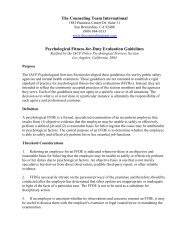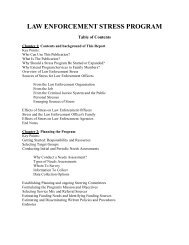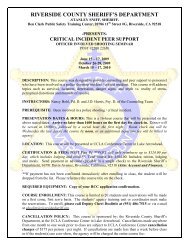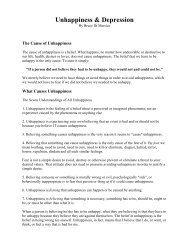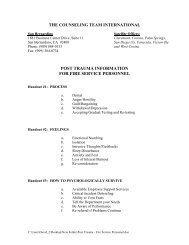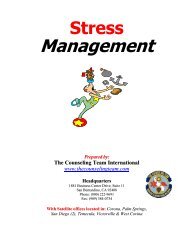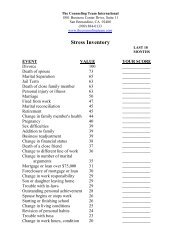ISSUES AND PRACTICES.pdf - The Counseling Team International
ISSUES AND PRACTICES.pdf - The Counseling Team International
ISSUES AND PRACTICES.pdf - The Counseling Team International
Create successful ePaper yourself
Turn your PDF publications into a flip-book with our unique Google optimized e-Paper software.
Currently, when the DOC asks PTR to conduct a critical incident debriefing, the counselors tryto arrange an educational debriefing with the affected officers' supervisors after having debriefedwith the officers. PTR staff use the sessions to--Explain what the counselors have done with the officersDescribe possible symptoms thesupervisors should be attuned to among the officers over the next several weeks (e.g.,short attention span, anger toward management) and how to respond to these symptoms.Urge the supervisors not to take the officers' anger personally but rather to let the officersvent--and provide them with information on what is being done about the incident.Describe the possible long-term consequences, such as hypervigilence, the incident mayhave for officers that the supervisors should watch for.Refer officers who exhibit these responses for possible counseling.<strong>The</strong> State workers' compensation insurer reimburses PTR on an hourly basis for some staffcounseling and debriefing services. <strong>The</strong> plan covers anyone who is involved in a life-threateningincident, suffers a physical injury, or has psychological symptoms as a result of a criticalincident. If the insurer refuses to pay, the DOC picks up the bill.Individual counselingIn the late 1980s, the South Carolina DOC developed a Post Assault Information Resource(PAIR) program. Every prison identified a PAIR representative, usually a social worker, ahuman resources staff person, or an associate warden. <strong>The</strong> department workers' compensationand human resources offices then trained the PAIR to work with the human resources office toobtain appropriate care for injured employees. Lawrence Bergmann, Post Trauma Resource'sdirector, trained the PAIRs to identify employees suffering stress after a critical incident.Whenever an employee has been assaulted, the human resources office automatically sends theperson a letter indicating the department offers free counseling services, telling interestedemployees to contact their prison PAIR. <strong>The</strong> PAIR then contacts the human resources office,which calls or writes employees to describe and offer PTR's services. Injured officers may alsocontact the department's victim services coordinator, who can also refer them to PTR.Post Trauma Resources' individual counseling to DOC employees is short term, typically lastingthree to six sessions. Occasionally, the counseling may continue for as long as 6 months. Forlonger term counseling, officers can go to the employee assistance program for treatment,although they are entitled to only three free visits with the EAP before paying according to asliding scale.Post Trauma Resources staff decide when an employee they are counseling can go back to workand what percentage time. Bergmann submits periodic status reports to John Near updating eachclient's ability to return to work. According to Near, "We don't want anyone in the DOC decidingwhen an officer is ready to come back to work--that's a conflict of interest and a confidentialityproblem. So it's very important to contract out for this service." Near says he has come to trustthat PTR counselors will return employees to work as soon as it is appropriate.




